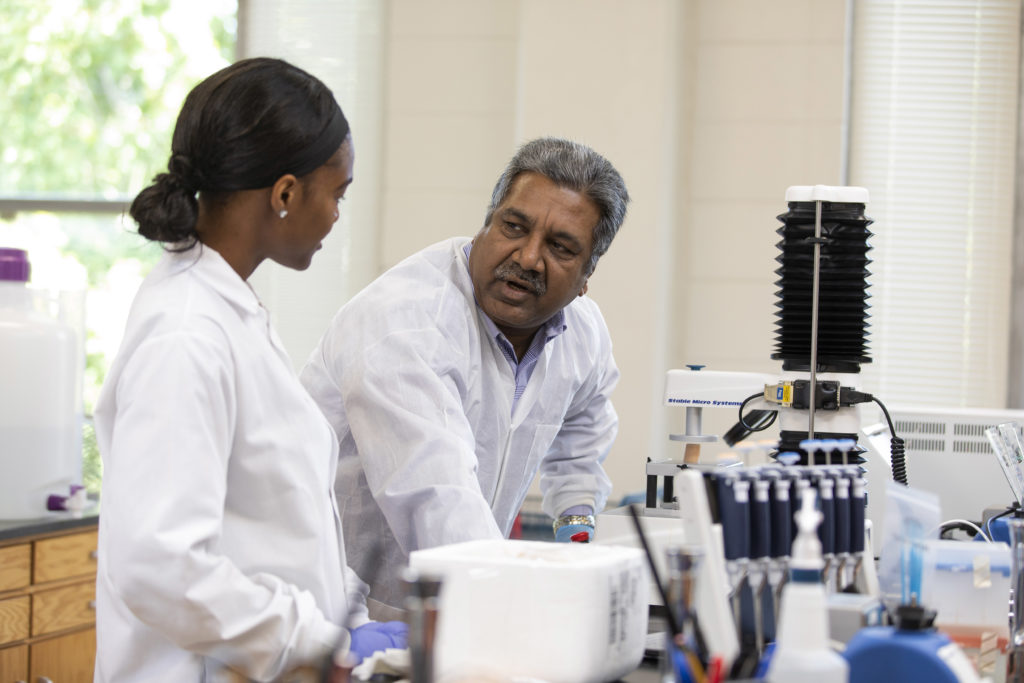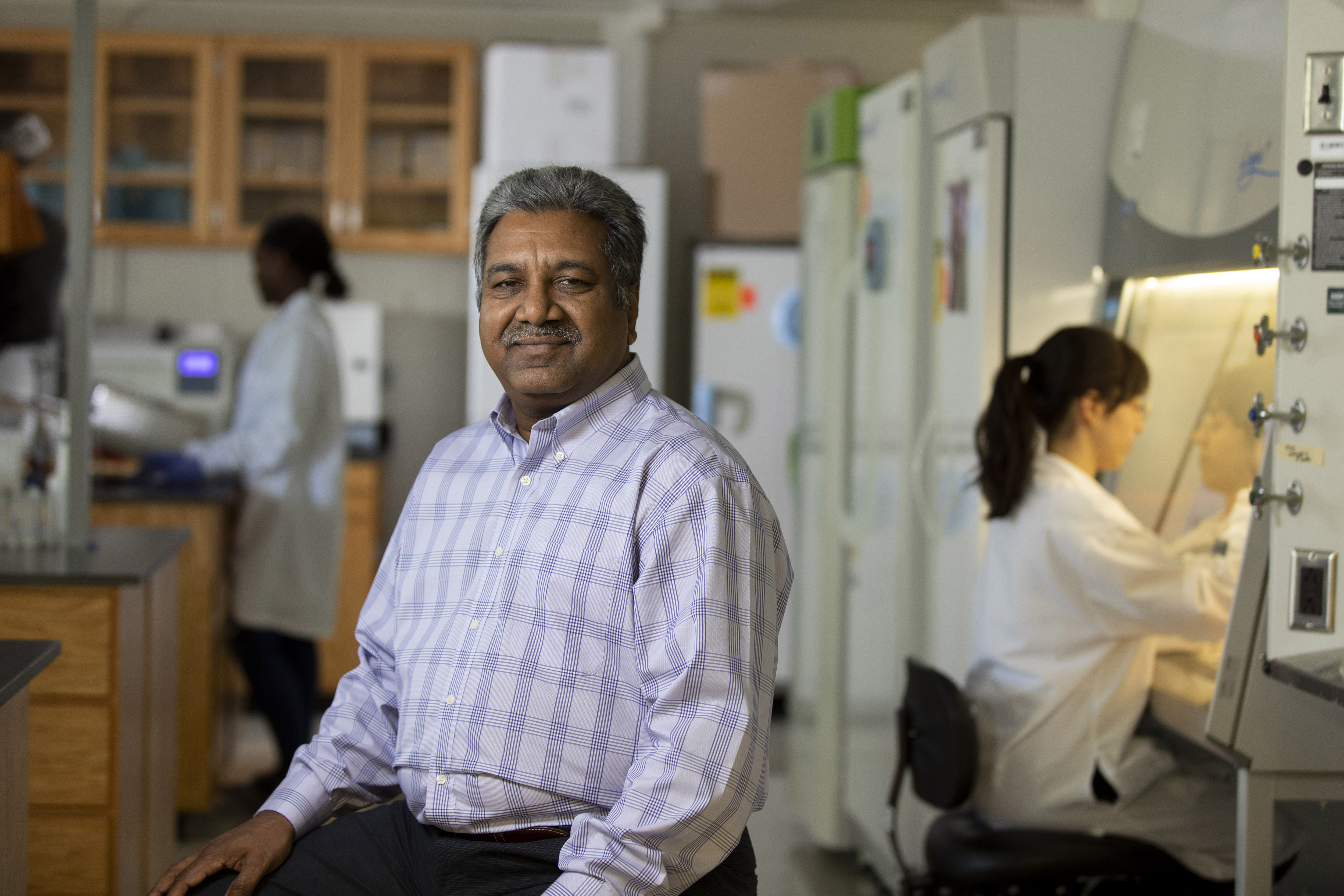Harshavardhan Thippareddi, the John Bekkers Professor of Poultry Science, educates students and conducts research that improves the quality and microbiological safety of poultry products and improves the sustainability and profitability of the poultry industry.
Where did you earn degrees and what are your current responsibilities at UGA?
I received my undergraduate degree in dairy technology from the Andhra Pradesh Agricultural University, Tirupathi, in India and my graduate degrees, M.S. and Ph.D. in food science, from Kansas State University. I started my academic career at the University of Nebraska-Lincoln in 2002, was awarded tenure and was later promoted to full professor. As an Extension food safety specialist, I had a major Extension appointment (70%) and a research appointment (30%), through which I conducted research on applied food safety to assist food processors and more specifically, meat processors (including the ONLY poultry processor in the state of Nebraska at that time) through my Extension appointment. Currently, I am the John Bekkers Professor of Poultry Science in the department of poultry science in the College of Agricultural and Environmental Sciences, where I have a research (75%) and teaching (25%) appointment. I conduct research on improving production yields, quality and microbiological quality and safety of poultry products, sustainability and ultimately, the profitability for the poultry industry.
When did you come to UGA and what brought you here?
I moved to the poultry science department at UGA from the food science department at the University of Nebraska-Lincoln in fall 2015. The high regard for UGA’s poultry science department in the U.S. poultry industry, the access and collaborative nature of the poultry industry in Georgia, the concentration of poultry scientists and poultry microbiologists in the department, the industry and the research organizations like the USDA National Poultry Research Center in Athens and, more importantly, the positive and significant impact we can have on the poultry industry, are major contributing factors for my move to UGA.
What are your favorite courses and why?
I teach an undergraduate course in poultry microbiology and an undergraduate and graduate course in poultry processing to our poultry science majors and other students. I love both these courses, as I see the amazing growth of students from not knowing the importance of microbiology and microbiological safety of foods to understanding the world of food safety and how to assure the safety of the foods. Also, every undergraduate student in the poultry science major gets opportunities to participate in internships with the industry every summer, and by the time they take my poultry processing course, they have seen the operations but do not understand the intricacies of each of those unit operations. Teaching the students those specifics and observing them relate to their prior experiences is incredible. They graduate with an excellent understanding of poultry processing and are well-prepared to venture out into the real world. Seeing them succeed in the industry is the most satisfying feeling for any faculty member.
What are some highlights of your career at UGA?
We just completed a series of research projects in collaboration with UGA meat science faculty and USDA Agricultural Research Service researchers that can have a $5 billion a year impact on the poultry processing industry and reduce the economic losses resulting from enhanced product utilization.
How do you describe the scope and impact of your research or scholarship to people outside of your field?
The impact of poultry product quality and safety is widespread. My research focus is on improving productivity, processing yields and the utilization of under-utilized poultry meats while assuring the quality and microbiological safety of poultry and poultry products.
Poultry is the number one meat consumed in the United States. For evidence, see the recent competition between Chick-fil-A and Popeyes on who has a better chicken sandwich. With an increasing world population and decreasing farmland due to various reasons, production and utilization of meat that is sustainable over the long range and also the most efficient in terms of feed conversion is critical—especially, to provide a quality meat at low-cost to the public. I see my research to be far-reaching, with high-impact in providing a nutritious product that is economical in a resource-sustainable way.

How does your research or scholarship inspire your teaching, and vice versa?
My students learn about current poultry production and processing systems and methods to improve aspects of the profitability, sustainability, quality and microbiological safety of poultry products. I work with the poultry processing industry in Georgia and across the United States and try to incorporate that knowledge into my teaching. Also, my interactions with the poultry industry informs my students on the issues the industry is facing and how they address those issues so they are prepared for success in industry positions when they graduate.
What do you hope students gain from their classroom experience with you?
Our students in poultry science have a 100% career placement rate when they graduate. Also, they are presented with numerous experiential learning opportunities every summer with the poultry industry here in Georgia as well as across the United States. The students return from their experiential learning opportunities and have a greater appreciation for poultry processing and microbiological quality and safety during the coursework. I see them grow and learn how each unit operation works in poultry processing and why processors follow certain procedures during processing.
Describe your ideal student.
Someone willing to work hard and is inquisitive, not afraid to make mistakes and a quick learner.
Favorite place to be/thing to do on campus is…
Be in the meat processing lab making the chicken-dawgs (spicy hotdogs with quality poultry meat).
Beyond the UGA campus, I like to…
Travel around the world, meeting people and having discussions on food processing and microbiological safety (while solving their processing issues)— something my position at UGA allows me to pursue.
Community/civic involvement includes…
I love to work with our students and help them with Poultry Science Club activities and others in and around campus.
Favorite book/movie (and why)?
“Casablanca,” which shows the human quest for a better life and our extraordinary ability to adapt.
The one UGA experience I will always remember will be…
Meeting Uga for the first time in Savannah during the New Faculty Tour.


